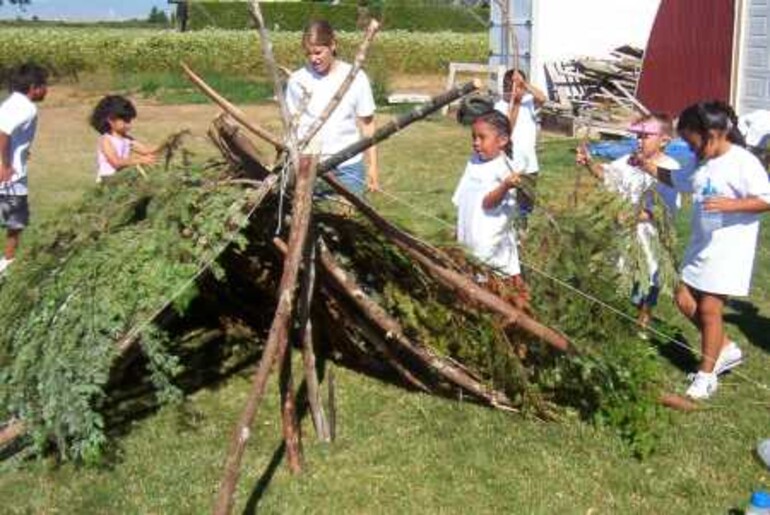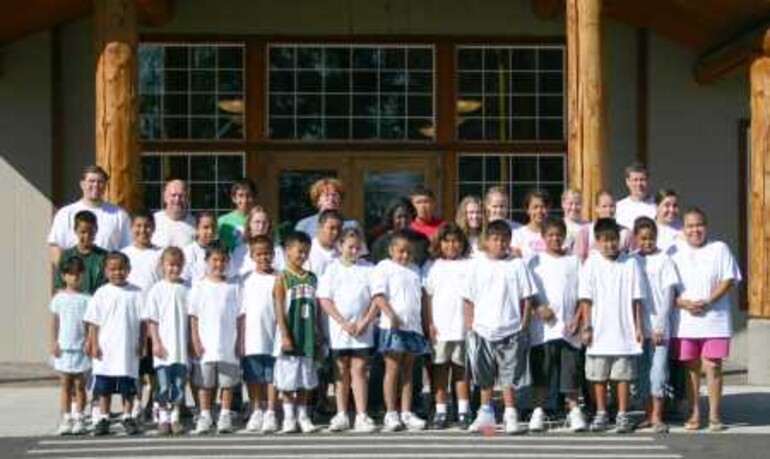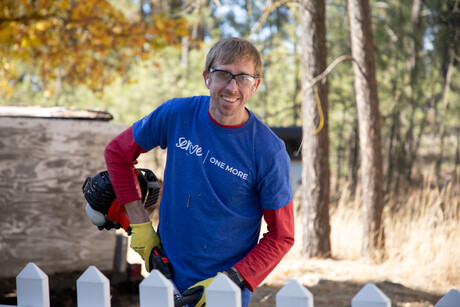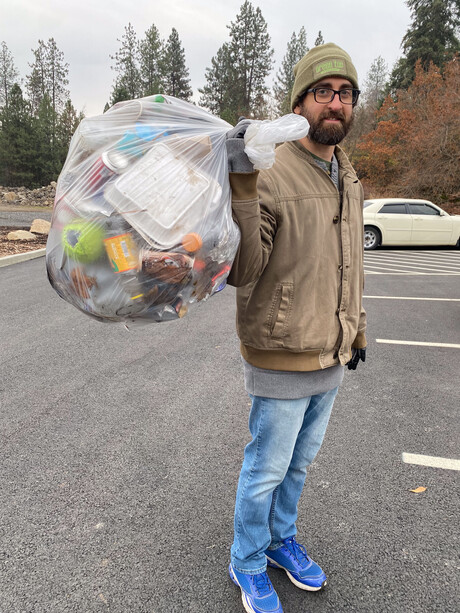Three days of survival camping with 16 campers between the ages of 11 and 13. Latrines instead of toilets, and only a glacial creek for bathing. Does it sound like fun yet? If you could ask many of the campers or staff members who participated in the survival challenge, they would tell you it was so much fun that they didn’t want to come home.
For the final week of Summer Day Camp 2005 at the All Nations Center, the staff hand-picked a group of the most trustworthy and mature 11–13-year-olds who would participate in a real-life application of the skills they learned during day camp in our camping and outdoor survival skills class. During their three-day trip, the campers were challenged to apply their newly acquired knowledge of first aid, orienteering, knife and axe safety, and the use of flagging tape for rescue purposes.
To build unity in the group, Andrew Bigelow led the students through an initiative problem-solving exercise, based on 1 Corinthians 12, that beautifully illustrated the importance of working together and supporting each other in the body of Christ. Bigelow joined the All Nations Center staff for the summer as part of a practicum placement through the adventure-based Youth Leadership Program at Canadian University College.
The exercise consisted of a web in which Bigelow had marked 24 holes through which the 20 people could be passed. The participants were placed inside the web and given the assignment of getting each person out without touching the actual web or breaking the “plane” of any hole other than the one being used to exit the web. Each hole could only be used once, and once a plane had been broken, that hole had to be used by whoever broke the plane. The students learned valuable problem-solving skills and saw how healthy touch, while not the focus of the exercise, was absolutely essential, just as it is in the body of Christ.
The survival challenge ended with an exercise simulating a wintertime bus crash, in which only the 16 campers and five staff members survived. The staff were all “wounded,” and the campers needed to address all the basic needs in order of urgency. They problem-solved and worked together to meet shelter, first aid, fire, and travel / rescue needs.
Camping and outdoor survival skills was only one of three classes offered in our fourth year of day camp. Arlene Celestine also taught native beadwork, where the students learned the entire process of creating a beading project. From the stringing of their looms, to the stitching of the finished beadwork onto buckskin, campers’ concentration and intensity of effort went beyond our greatest expectations. Beading class became a passion for many campers, who could be found working on their projects during any free time throughout the week. Celestine also reminded the campers that in the Native American tradition, a child gives their first piece of artwork to an elder as a sign of respect and gratitude.
Campers learned discipline and teamwork under the watchful eye of march and drill instructor Robert Sanders (WO2-US Army). Although the class didn’t start out as a favorite among campers, by the Thursday night Family Night program, they were very proud to be able to execute their routines with the skill and precision made possible by hours of hard work. The march and drill class was included in this year’s camp because of its emphasis on discipline, immediate obedience, teamwork and selflessness, and the need to follow your own specific orders in a routine, no matter what everyone around you may be doing. All of these are valuable life lessons, and Bob Sanders did a marvelous job of illustrating them for the campers in a humorous, yet challenging way.
Each day of camp, after a delicious lunch prepared by Lorrie Kravig, the campers headed off to their afternoon activities. These included bowling, swimming at the pool, a water fight on the back lawn of the ANC, and graffiti busting around the city of Wapato.
Graffiti busting has been a part of day camp since 2002, which has earned the All Nations Center the reputation of being the largest contributor to this important community effort. This year the city council of Wapato and some local leaders showed their support of this valuable community service in buying the campers sports drinks to battle the 102° temperatures, and “Graffiti Busters” T-shirts to wear proudly in their community. The Wapato Dairy Queen donated ice cream cones for campers and staff members as they finished their assigned projects. Wapato Chief of Police Rick Sanchez came and ate lunch with the kids on Wednesday, and thanked them for their service. He challenged them to take pride in their town and respect other’s property as they would their own.
Three newspaper articles helped to make the community aware of the graffiti busting projects, and gave the campers a healthy sense of pride in their service. We pray that these articles will also create a greater degree of concern and communication that will help local leaders and citizens work together to end the graffiti problem.
Each week the students had many opportunities to develop the character traits Peter Trzinski, All Nations Center pastor, illustrated in his morning devotionals. Trzinski used humorous and memorable illustrations to teach attentiveness, obedience, truthfulness, orderliness and sincerity. Staff members saw God at work as campers’ lives were changed and characters developed through the day camp experiences.











